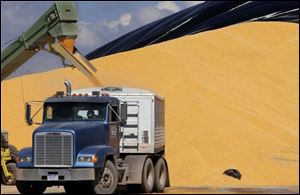
Ethanol opponents making hay with increases in world food prices
5/11/2008
A coalition says ethanol production siphons off corn that would be fed to livestock.
WASHINGTON - The global rise in food prices is giving political ammunition to opponents of the country's ethanol policy and stirring uncertainty for the burgeoning and heavily subsidized biofuels industry.
An informal coalition of oil refiners, environmentalists, and food processors is trying to convince lawmakers that increased output of the alternative fuel is inflating food costs by siphoning off corn otherwise fed to livestock and discouraging U.S. farmers from planting wheat, soybeans, and other crops.
They also argue that constraints on ethanol distribution are contributing to higher prices at the pump, and that the biofuel is unlikely to reduce greenhouse-gas emissions - and may even increase them.
Farmers and other ethanol supporters dispute these contentions. But the lobbying blitz appears to be having some impact in Congress and is putting shares of ethanol companies under pressure.
To help wean the country off oil imports, Congress granted the country's budding biofuels industry a 51-cent-a-gallon tax credit and a law requiring a five-fold increase in output over the next 15 years.
But twenty-four Republican senators, including presidential candidate John McCain, of Arizona, have sent a letter to the Environmental Protection Agency urging it to repeal or roll back ethanol output targets stipulated in energy legislation passed in December.
The ethanol industry says it is being unfairly linked to the worldwide rise in food prices. Officials say food prices are going up mainly because of rising demand from developing countries, weather conditions that have hurt crops, and higher costs for fuel and packaging.
Oil refiners have opposed the mandate for ethanol use since a milder version was put into effect in 2005 because, they argue, it increases the expense and hassle of refining oil into gas.
"We have hard evidence now that there are unintended consequences" of increased ethanol use, said Frank Maisano, a spokesman for several oil refiners.
Food processors, meanwhile, argue that the consequences will only get worse.
"Food prices are going to get higher, not lower," said Scott Faber, vice president of federal affairs at the Grocery Manufacturers of America. "Inevitably, lawmakers will have to revisit and recalibrate these mandates."
Farmers diverted about 25 percent of their corn crop to ethanol production last year, and are planting more corn at the expense of other crops, such as wheat and soybeans, the trade group said.
That's led to higher prices for grains. Consumers have felt the impact in costlier meat, eggs, and milk.